初中英语句子结构讲解及练习题-教案Word版
初中英语句子结构讲解及练习题教案

初中英语句子结构讲解及练习题教案第一章:英语句子的基本结构1.1 介绍英语句子的基本结构,包括主语、谓语和宾语。
1.2 解释简单句、并列句和复合句的概念。
1.3 举例说明不同类型的句子结构。
第二章:名词性从句2.1 介绍名词性从句的概念和用途。
2.2 解释宾语从句、定语从句和同位语从句的区别。
2.3 提供名词性从句的练习题,让学生进行实际操作。
第三章:形容词性从句3.1 介绍形容词性从句的概念和用途。
3.2 解释定语从句和状语从句的区别。
3.3 提供形容词性从句的练习题,让学生进行实际操作。
第四章:副词性从句4.1 介绍副词性从句的概念和用途。
4.2 解释状语从句和补语从句的区别。
4.3 提供副词性从句的练习题,让学生进行实际操作。
第五章:句子的一致性5.1 介绍句子的一致性概念和重要性。
5.2 解释主谓一致和动宾一致的原则。
5.3 提供句子一致性的练习题,让学生进行实际操作。
第六章:情态动词句型6.1 介绍情态动词的概念和用法。
6.2 解释情态动词在不同句型中的搭配,如疑问句、否定句和条件句。
6.3 提供情态动词句型的练习题,让学生进行实际操作。
第七章:被动语态7.1 介绍被动语态的概念和用途。
7.2 解释被动语态的构成和用法。
7.3 提供被动语态的练习题,让学生进行实际操作。
第八章:虚拟语气8.1 介绍虚拟语气的概念和用途。
8.2 解释虚拟语气的构成和用法,包括现在虚拟、过去虚拟和将来虚拟。
8.3 提供虚拟语气的练习题,让学生进行实际操作。
第九章:句子转换9.1 介绍句子转换的概念和重要性。
9.2 解释将陈述句转换为疑问句、感叹句和祈使句的方法。
9.3 提供句子转换的练习题,让学生进行实际操作。
第十章:综合练习与提高10.2 设计一些较难的练习题,让学生进行挑战。
10.3 提供一些实际语境的练习题,让学生学会在实际情境中运用所学的句子结构。
重点和难点解析一、名词性从句难点解析:名词性从句中的宾语从句、定语从句和同位语从句在句子中的功能和位置不同,学生需要理解并区分它们。
(完整word版)英语句子成分和英语句子基本结构讲解及练习
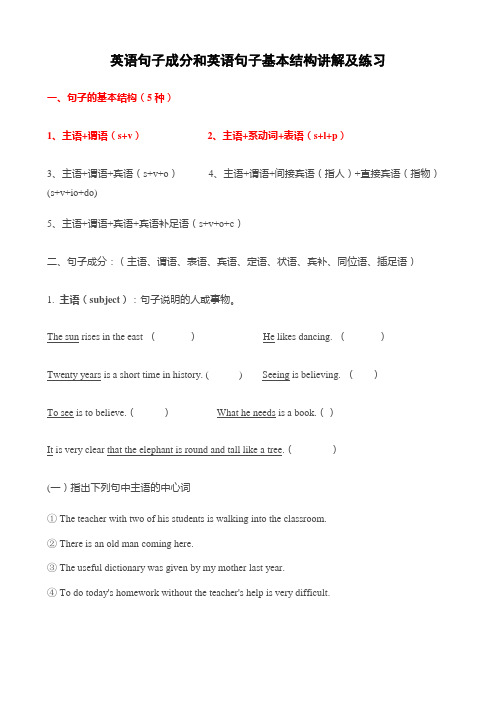
英语句子成分和英语句子基本结构讲解及练习一、句子的基本结构(5种)1、主语+谓语(s+v)2、主语+系动词+表语(s+l+p)3、主语+谓语+宾语(s+v+o)4、主语+谓语+间接宾语(指人)+直接宾语(指物)(s+v+io+do)5、主语+谓语+宾语+宾语补足语(s+v+o+c)二、句子成分:(主语、谓语、表语、宾语、定语、状语、宾补、同位语、插足语)1. 主语(subject):句子说明的人或事物。
The sun rises in the east ()He likes dancing. ()Twenty years is a short time in history. ( ) Seeing is believing. ()To see is to believe.()What he needs is a book.()It is very clear that the elephant is round and tall like a tree.()(一)指出下列句中主语的中心词① The teacher with two of his students is walking into the classroom.② There is an old man coming here.③ The useful dictionary was given by my mother last year.④ To do today's homework without the teacher's help is very difficult.2. 谓语(predicate):是对主语加以陈述,表示主语的行为或状态,常用动词或者动词词组担任,放在主语的后面。
We study English. He is asleep.(二). 选出句中谓语的中心词① I don't like the picture on the wall. A. don't B. like C. picture D. wall② The days get longer and longer when summer comes. A. get B.longer C. days D. summer③ Do you usually go to school by bus? A. Do B. usually C. go D. bus④ There will be a meeting at the library this afternoon.A. will beB. meetingC. the libraryD. afternoon⑤ Did the twins have porridge for their breakfast? A. Did B. twins C. have D. breakfast3. 表语(predicative):系动词之后的成分,表示主语的性质、状态和特征。
(英语)初中英语句子结构与成分解题技巧讲解及练习题(含答案)

(英语)初中英语句子结构与成分解题技巧讲解及练习题(含答案)一、句子结构与成分1.'My father bought me a new watch yesterday.' It is a structure of.A. S+V+PB. S+V+IO+DOC. S+V+DO+COD. S+V+DO【答案】B【解析】【分析】句意:昨天我爸给我买了一块新手表。
它是S+V+IO+DO结构。
My father (主语S) +bought (谓语V) +me (间接宾语ID) +a new watch (直接宾语DO),故选Bo【点评】考查句结构和成分。
注意识记S+V+IO+DO结构的用法。
2.—What an interesting story she told us!—Yes, and her voice sounded.A. sweetB. smallC. clearlyD. sadly【答案】A【解析】【分析】句意:一一他给我们讲的是多么有趣的故事啊!一一是的,她的声音听起来很甜美。
sweet甜的;small小的;clearly清楚地;sadly伤心地。
sound是系动词,后跟形容词,故选Ao【点评】考查系表结构。
3.John calls his dog Eddie. The structure of the sentence is.A. S+V+OB. S+V+PC. S+V+IO+DOD. S+V+DO+OC【答案】D【解析】【分析】句意:约翰叫他的狗Eddie.这个句子的结构是.根据句子可知这个句子的结构是:主语 +谓语+宾语+宾语补足语。
故答案为Do【点评】考查句子成分。
牢记句子成分。
4.Choose the correct structure (结构)of this sentence "He lent me a book."A. S+V+OB. S+V+IO+DOC. S+V+PD. S+V+DO+OC【答案】B【解析】【分析】句意"Helent me a book”。
英语句子结构知识讲义与练习(五篇范例)

英语句子结构知识讲义与练习(五篇范例)第一篇:英语句子结构知识讲义与练习英语写作讲义与练习英语句子结构知识讲义与练习一.词类英语的词有实词与虚词两种。
实词都有实义,共有六类:1)名词(noun),如book,water2)代词(pronoun),如I ,you3)形容词(adjective),如beautiful,happy4)数词(numeral),如four,third5)动词(verb),如come,take6)副词(adverb),如there,today,carefully虚词没有实义,共有四类:1)冠词(article),如a,an the2)介词(preposition),如in, at,on,of3)连词(conjunction),如and,or4)感叹词(interjection),如oh二.句子成分一个句子一般皆由两部分组成,即主语部分和谓语部分。
如:I get up early every day.主语:是一句的主体,是全句述说的对象,常用名词、代词或相当于名词的词或从句担任,一般位于句首。
如:I respect his privacy.谓语:是说明主语的动作或状态的,常用动词担任,置于主语之后。
如:The sun rises in the east.宾语:是表示及物动词的动作对象和介词所联系的对象的,常由名词或相当于名词的词担任,置于及物动词或介词之后。
如:She gave a roar of pain.定语:是限定或修饰名词或相当于名词的词的,常由形容词或相当于形容词的短语或从句担任。
形容词常置于名词之前,相当于形容词的短语或从句常置于名词之后。
如:John had a great desire to travel.状语:是修饰动词、形容词、副词以及全句的,常同副词或相当于副词的短语或从句担任。
修饰动词时,可置于动词之前,亦可置于动词之后;修饰形容词或副词时,常置于它们之前。
初中英语句子结构讲解及练习题教案

初中英语句子结构讲解及练习题教案第一章:引言教学目标:1. 让学生了解英语句子的基本结构。
2. 培养学生对英语句子结构的兴趣和好奇心。
教学内容:1. 介绍英语句子的基本结构。
2. 举例说明不同类型的英语句子。
教学活动:1. 引入话题:让学生思考他们学过的英语句子。
2. 讲解英语句子的基本结构:主语、谓语、宾语、定语、状语。
3. 举例说明不同类型的英语句子:陈述句、疑问句、命令句、感叹句。
练习题:1. 填空题:根据句子结构的知识,填空完成句子。
2. 选择题:从给出的选项中选择正确的句子结构。
第二章:主谓结构教学目标:1. 让学生掌握主谓结构的基本概念。
2. 培养学生正确使用主谓结构的能力。
教学内容:1. 介绍主谓结构的概念和重要性。
2. 讲解主谓结构的构成:主语、谓语。
3. 举例说明不同类型的主谓结构。
教学活动:1. 回顾上一章的内容:英语句子的基本结构。
2. 讲解主谓结构的概念和重要性。
3. 举例说明不同类型的主谓结构:简单句、并列句、复合句。
练习题:1. 填空题:根据主谓结构的知识,填空完成句子。
2. 改错题:找出句子中的主谓结构错误并进行改正。
第三章:宾语结构教学目标:1. 让学生掌握宾语结构的基本概念。
2. 培养学生正确使用宾语结构的能力。
教学内容:1. 介绍宾语结构的概念和重要性。
2. 讲解宾语结构的构成:宾语、间接宾语。
3. 举例说明不同类型的宾语结构。
教学活动:1. 回顾前两章的内容:英语句子的基本结构和主谓结构。
2. 讲解宾语结构的概念和重要性。
3. 举例说明不同类型的宾语结构:简单宾语、复合宾语、双宾语。
练习题:1. 填空题:根据宾语结构的知识,填空完成句子。
2. 改错题:找出句子中的宾语结构错误并进行改正。
第四章:定语和状语结构教学目标:1. 让学生掌握定语和状语结构的基本概念。
2. 培养学生正确使用定语和状语结构的能力。
教学内容:1. 介绍定语和状语结构的概念和重要性。
2. 讲解定语和状语结构的构成:定语、状语。
初中英语句子结构教案

初中英语句子结构教案教学目标:1. 让学生掌握英语基本句型结构,如主语+谓语+宾语,主语+谓语+状语等。
2. 培养学生运用英语句型进行表达的能力。
3. 提高学生英语语法和句子结构的理解能力。
教学内容:1. 英语基本句型结构2. 句子成分分析3. 句子结构应用教学过程:Step 1:引入新课1. 向学生提问:“你们知道我们平时说的英语句子是由哪些部分组成的吗?”2. 引导学生回顾已学的英语单词:主语、谓语、宾语、状语等。
Step 2:讲解句型结构1. 讲解英语基本句型结构,如主语+谓语+宾语,主语+谓语+状语等。
2. 通过例句展示各种句型结构,让学生理解并区分。
Step 3:句子成分分析1. 讲解句子成分,包括主语、谓语、宾语、状语等。
2. 分析典型句子,让学生识别句子成分。
Step 4:句子结构应用1. 让学生运用所学的句型结构和句子成分进行造句。
2. 学生互相交流,分享自己的句子。
Step 5:巩固练习1. 给出一些句子,让学生判断句子结构是否正确。
2. 让学生修改错误的句子结构。
Step 6:课堂小结1. 回顾本节课所学的内容,让学生总结英语句子结构的特点。
2. 强调句子结构在英语学习中的重要性。
Step 7:作业布置1. 让学生课后用所学的句型结构造句。
2. 让学生总结英语句子结构的规律,加深对句子结构的理解。
教学反思:通过本节课的教学,发现学生在掌握英语句子结构方面存在一定的问题。
在今后的教学中,应加强对学生句子结构的训练,多让学生进行句子结构的练习,提高学生的句子结构运用能力。
同时,注重培养学生的英语思维,使他们在表达时能够更加准确、流畅。
初中英语句子结构讲解教案

初中英语句子结构讲解教案教学目标:1. 让学生掌握英语的基本句子结构,包括主语、谓语、宾语、定语、状语等成分。
2. 培养学生正确运用句子结构进行表达的能力。
3. 提高学生对英语句子的理解和运用能力。
教学内容:1. 英语句子的基本结构2. 句子成分的识别和运用3. 不同句子结构的表达方式教学过程:一、导入(5分钟)1. 引导学生回顾已学的英语单词和短语。
2. 提问:你们知道英语句子是由哪些部分组成的吗?二、讲解句子结构(15分钟)1. 介绍英语句子的基本结构,包括主语、谓语、宾语、定语、状语等成分。
2. 通过示例句子,讲解各个成分的作用和位置。
3. 强调句子结构的重要性,引导学生注意句子成分的搭配。
三、句子成分练习(15分钟)1. 给学生发放练习题,要求识别和标出句子中的各个成分。
2. 引导学生运用所学知识,独立完成练习题。
3. 讲解练习题中的重点和难点,让学生充分理解句子结构。
四、不同句子结构的表达方式(15分钟)1. 介绍不同句子结构的特点和用法。
2. 通过示例句子,讲解各种句子结构的表达方式。
3. 引导学生进行句子结构的练习,提高运用能力。
五、总结和作业布置(5分钟)1. 对本节课的内容进行总结,强调句子结构的重要性。
2. 布置作业:要求学生运用所学知识,写出一个完整的句子,并正确标出各个成分。
教学评价:1. 课后收集学生的作业,检查对句子结构的掌握程度。
2. 在下一节课开始时,让学生进行句子结构的知识测试,以评估学习效果。
3. 观察学生在日常英语学习中的表现,了解对句子结构的应用能力。
教学反思:本节课通过讲解和练习,让学生掌握了英语句子的基本结构,提高了对句子成分的识别和运用能力。
在教学过程中,要注意引导学生注意句子结构的搭配,避免出现成分残缺或错误的情况。
同时,要加强练习,让学生在实际应用中灵活运用所学知识。
初中英语句子结构成份讲解及专项练习(含答案)
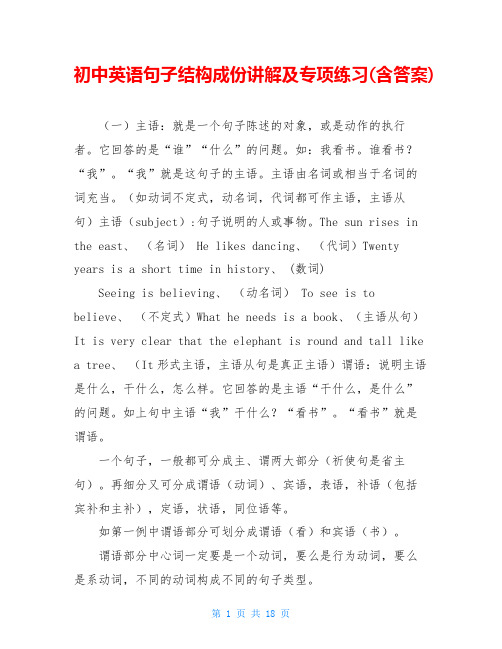
初中英语句子结构成份讲解及专项练习(含答案)(一)主语:就是一个句子陈述的对象,或是动作的执行者。
它回答的是“谁”“什么”的问题。
如:我看书。
谁看书?“我”。
“我”就是这句子的主语。
主语由名词或相当于名词的词充当。
(如动词不定式,动名词,代词都可作主语,主语从句)主语(subject):句子说明的人或事物。
The sun rises in the east、(名词) He likes dancing、(代词)Twenty years is a short time in history、 (数词)Seeing is believing、(动名词) To see is to believe、(不定式)What he needs is a book、(主语从句)It is very clear that the elephant is round and tall like a tree、(It形式主语,主语从句是真正主语)谓语:说明主语是什么,干什么,怎么样。
它回答的是主语“干什么,是什么”的问题。
如上句中主语“我”干什么?“看书”。
“看书”就是谓语。
一个句子,一般都可分成主、谓两大部分(祈使句是省主句)。
再细分又可分成谓语(动词)、宾语,表语,补语(包括宾补和主补),定语,状语,同位语等。
如第一例中谓语部分可划分成谓语(看)和宾语(书)。
谓语部分中心词一定要是一个动词,要么是行为动词,要么是系动词,不同的动词构成不同的句子类型。
句子的各种时态、人称和数的变化都在谓语动词上变。
谓语(predicate):说明主语的动作、状态和特征。
We study English、 He is asleep、宾语:指谓语动词所涉及的对象,由名、代、数,宾语从句等相当于名词的词句充当,但人称代词要用宾格。
如:还说上例。
谓语动词是“看”,看什么?看“书”,“书”是动词“看”所涉及的对象,是“看”的宾语。
需要说明的是:只有及物动词和介词或相当于及物动词和介词的短语才可带宾语。
(完整版)初中英语句子成分讲解_练习及答案
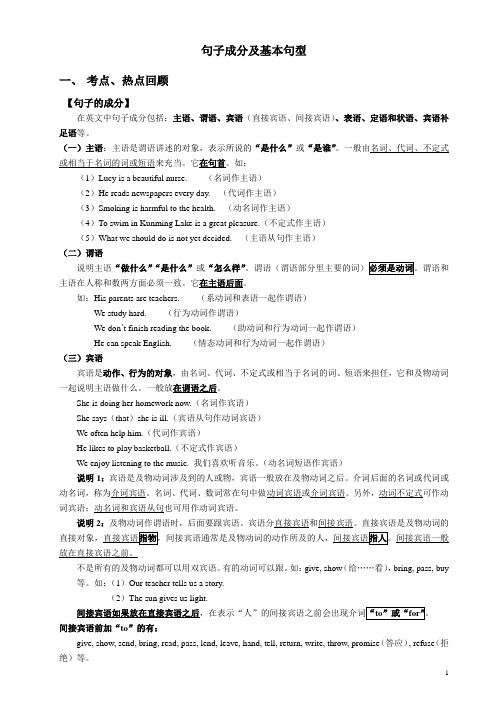
句子成分及基本句型一、考点、热点回顾【句子的成分】在英文中句子成分包括:主语、谓语、宾语(直接宾语、间接宾语)、表语、定语和状语、宾语补足语等。
(一)主语:主语是谓语讲述的对象,表示所说的“是什么”或“是谁”。
一般由名词、代词、不定式或相当于名词的词或短语来充当。
它在句首。
如:(1)Lucy is a beautiful nurse. (名词作主语)(2)He reads newspapers every day. (代词作主语)(3)Smoking is harmful to the health. (动名词作主语)(4)To swim in Kunming Lake is a great pleasure.(不定式作主语)(5)What we should do is not yet decided. (主语从句作主语)(二)谓语说明主语“做什么”“是什么”或“怎么样”主语在人称和数两方面必须一致。
它在主语后面。
如:His parents are teachers. (系动词和表语一起作谓语)We study hard. (行为动词作谓语)We don’t finish reading the book. (助动词和行为动词一起作谓语)He can speak English. (情态动词和行为动词一起作谓语)(三)宾语宾语是动作、行为的对象,由名词、代词、不定式或相当于名词的词、短语来担任,它和及物动词一起说明主语做什么。
一般放在谓语之后。
She is doing her homework now.(名词作宾语)She says(that)she is ill.(宾语从句作动词宾语)We often help him.(代词作宾语)He likes to play basketball.(不定式作宾语)We enjoy listening to the music. 我们喜欢听音乐。
(动名词短语作宾语)说明1:宾语是及物动词涉及到的人或物,宾语一般放在及物动词之后。
初中英语句子地基本结构和类型讲解、练习
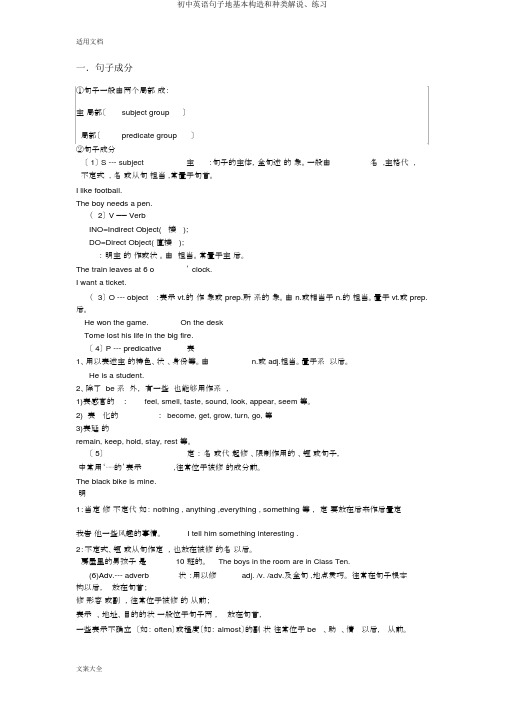
一.句子成分①句子一般由两个局部成:主局部〔subject group〕局部〔predicate group〕②句子成分〔 1〕 S --- subject主:句子的主体,全句述的象。
一般由名,主格代,不定式 ,名或从句担当,常置于句首。
I like football.The boy needs a pen.(2〕 V —— VerbINO=Indirect Object( 接 );DO=Direct Object( 直接 );:明主的作或状。
由担当。
常置于主后。
The train leaves at 6 o’ clock.I want a ticket.(3〕 O --- object :表示 vt.的作象或 prep.所系的象。
由 n.或相当于 n.的担当。
置于 vt.或 prep.后。
He won the game.On the deskTome lost his life in the big fire.〔 4〕 P --- predicative表1、用以表述主的特色、状、身份等。
由n.或 adj.担当。
置于系以后。
He is a student.2、除了 be 系外,有一些也能够用作系,1)表感官的 : feel, smell, taste, sound, look, appear, seem 等。
2) 表化的:become, get, grow, turn, go, 等3)表延的remain, keep, hold, stay, rest 等。
〔 5〕定:名或代起修、限制作用的、短或句子,中常用‘⋯⋯的’表示,往常位于被修的成分前。
The black bike is mine.明1:当定修不定代如: nothing , anything ,everything , something 等,定要放在后来作后置定我告他一些风趣的事情。
I tell him something interesting .2:不定式、短或从句作定,也放在被修的名以后。
(英语)初中必备英语句子结构与成分技巧全解及练习题(含答案)及解析

(英语)初中必备英语句子结构与成分技巧全解及练习题(含答案)及解析一、句子结构与成分1.'My father bought me a new watch yesterday.' It is a structure of_________.A. S+V+PB. S+V+IO+DOC. S+V+DO+COD. S+V+DO【答案】 B【解析】【分析】句意:昨天我爸给我买了一块新手表。
它是S+V+IO+DO结构。
My father (主语S)+bought(谓语V)+me(间接宾语ID)+a new watch(直接宾语DO),故选B。
【点评】考查句结构和成分。
注意识记S+V+IO+DO结构的用法。
2.Which of the following sentences is correct?A. He came in and sat down.B. We all like <Harry Potter>.C. When we met. He didn't say hello.D. We went out, headed for the bus stop.【答案】 A【解析】【分析】句意:下面那个句子是正确的。
A是简单句,came和sat是并列谓语,都是一般过去式,所以A正确。
B中的符号不符合英语习惯,在英语中没有书名号,表示书名时通常用斜体字形式。
C句的标点符号是错误的,把met后的句号改为逗号才符合复合句的定义。
D句中headed前应加上and或者将headed改为heading构成伴随状语。
因此选A。
【点评】考查句法知识。
3.John calls his dog Eddie. The structure of the sentence is _______.A. S+V+OB. S+V+PC. S+V+IO+DOD. S+V+DO+OC【答案】D【解析】【分析】句意:约翰叫他的狗Eddie.这个句子的结构是_____________.根据句子可知这个句子的结构是:主语+谓语+宾语+宾语补足语。
初中英语句子结构讲解及练习题教案

初中英语句子结构讲解及练习题教案第一章:英语句子的基本成分1.1 英语句子的构成主语谓语宾语定语状语1.2 句子成分的练习题1. 填空题:选出正确的主语、谓语、宾语、定语、状语。
2. 改错题:找出并改正句子中的错误成分。
第二章:简单句的类型2.1 陈述句定义结构例子2.2 疑问句定义结构例子2.3 祈使句定义结构例子2.4 感叹句定义结构例子2.5 简单句练习题1. 选择题:判断句子属于哪种简单句类型。
2. 改写题:将陈述句改写为疑问句、祈使句、感叹句。
第三章:并列句3.1 并列句的定义和结构并列句的定义并列句的结构3.2 常用的并列连词并列连词的定义并列连词的例子3.3 并列句的练习题1. 填空题:使用适当的并列连词填空。
2. 改写题:将句子改写为并列句。
第四章:复合句4.1 复合句的定义和结构复合句的定义复合句的结构4.2 常用的从句连接词从句连接词的定义从句连接词的例子4.3 复合句的练习题1. 填空题:使用适当的从句连接词填空。
2. 改写题:将句子改写为复合句。
第五章:句子结构的应用5.1 句子结构的实际应用句子的连贯性句子的多样性5.2 句子结构练习题1. 改写题:根据要求改写句子,提高句子的连贯性和多样性。
2. 作文题:运用所学句子结构编写短文。
第六章:被动语态6.1 被动语态的定义和结构被动语态的定义被动语态的结构6.2 被动语态的运用场合被动语态的常用情境6.3 被动语态的练习题1. 填空题:使用被动语态填空。
2. 改写题:将句子改写为被动语态。
第七章:虚拟语气7.1 虚拟语气的定义和结构虚拟语气的定义虚拟语气的结构7.2 虚拟语气的运用场合虚拟语气的常用情境7.3 虚拟语气的练习题1. 填空题:使用虚拟语气填空。
2. 改写题:将句子改写为虚拟语气。
第八章:句子分类8.1 陈述句定义结构例子8.2 疑问句定义结构例子8.3 祈使句定义结构例子8.4 感叹句定义结构例子8.5 句子分类练习题1. 选择题:判断句子属于哪种类型。
初中英语句子结构讲解及练习题教案
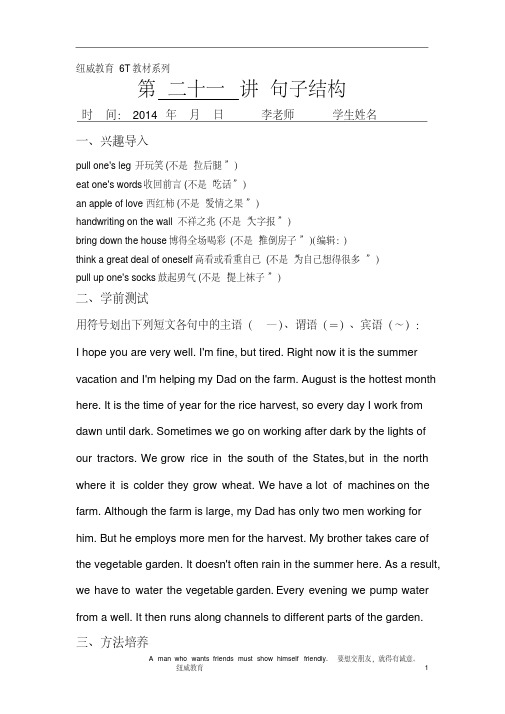
纽威教育6T教材系列第二十一讲句子结构时间: 2014 年月日李老师学生姓名一、兴趣导入pull one's leg 开玩笑(不是“拉后腿”)eat one's words 收回前言(不是“吃话”)an apple of love 西红柿(不是“爱情之果”)handwriting on the wall 不祥之兆(不是“大字报”)(编辑:)bring down the house 博得全场喝彩(不是“推倒房子”)think a great deal of oneself 高看或看重自己(不是“为自己想得很多”)pull up one's socks 鼓起勇气(不是“提上袜子”)二、学前测试用符号划出下列短文各句中的主语(—)、谓语(=)、宾语(~):I hope you are very well. I'm fine, but tired. Right now it is the summer vacation and I'm helping my Dad on the farm. August is the hottest month here. It is the time of year for the rice harvest, so every day I work from dawn until dark. Sometimes we go on working after dark by the lights of our tractors. We grow rice in the south of the States, but in the north where it is colder they grow wheat. We have a lot of machines on the farm. Although the farm is large, my Dad has only two men working for him. But he employs more men for the harvest. My brother takes care of the vegetable garden. It doesn't often rain in the summer here. As a result, we have to water the vegetable garden. Every evening we pump water from a well. It then runs along channels to different parts of the garden. 三、方法培养组成句子的各个部分叫句子成分。
英语好句结构讲解教案初中
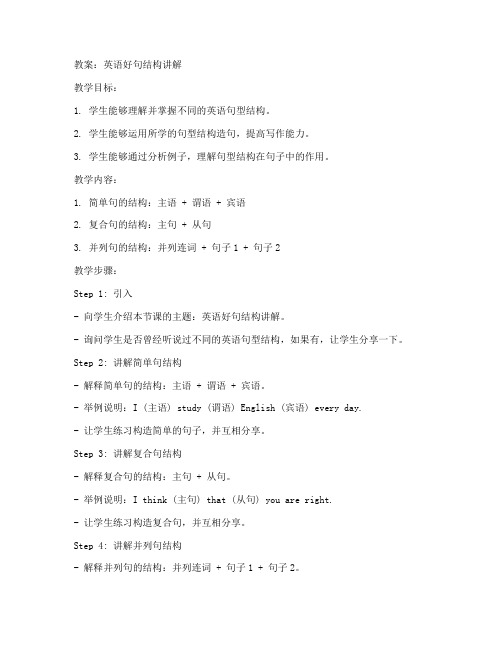
教案:英语好句结构讲解教学目标:1. 学生能够理解并掌握不同的英语句型结构。
2. 学生能够运用所学的句型结构造句,提高写作能力。
3. 学生能够通过分析例子,理解句型结构在句子中的作用。
教学内容:1. 简单句的结构:主语 + 谓语 + 宾语2. 复合句的结构:主句 + 从句3. 并列句的结构:并列连词 + 句子1 + 句子2教学步骤:Step 1: 引入- 向学生介绍本节课的主题:英语好句结构讲解。
- 询问学生是否曾经听说过不同的英语句型结构,如果有,让学生分享一下。
Step 2: 讲解简单句结构- 解释简单句的结构:主语 + 谓语 + 宾语。
- 举例说明:I (主语) study (谓语) English (宾语) every day.- 让学生练习构造简单的句子,并互相分享。
Step 3: 讲解复合句结构- 解释复合句的结构:主句 + 从句。
- 举例说明:I think (主句) that (从句) you are right.- 让学生练习构造复合句,并互相分享。
Step 4: 讲解并列句结构- 解释并列句的结构:并列连词 + 句子1 + 句子2。
- 举例说明:I like (句子1) apples (并列连词 + 句子2) and (并列连词 + 句子2) oranges (句子2).- 让学生练习构造并列句,并互相分享。
Step 5: 练习和巩固- 提供一些例子,让学生分析并指出句子中的不同句型结构。
- 让学生尝试将简单的句子转换为复合句或并列句,并互相分享。
Step 6: 总结和作业- 总结本节课所学的不同句型结构:简单句、复合句和并列句。
- 布置作业:让学生写一篇小短文,尽量使用不同的句型结构,并互相交换批改。
教学评估:- 在课堂上观察学生的参与度和理解程度。
- 收集学生的作业,评估他们对于不同句型结构的掌握情况。
教学反思:通过本节课的教学,学生应该已经掌握了一定的英语句型结构知识,并能够运用到实际写作中。
初中英语 句子的基本结构和类型讲解、练习
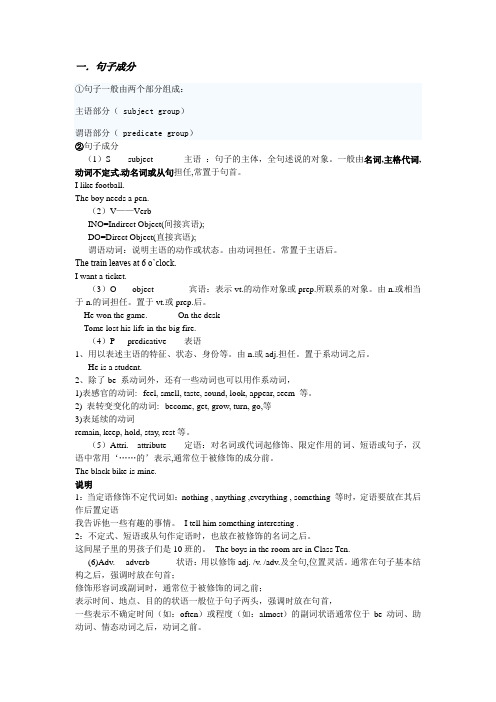
一.句子成分①句子一般由两个部分组成:主语部分( subject group)谓语部分( predicate group)②句子成分(1)S --- subject 主语:句子的主体,全句述说的对象。
一般由名词,主格代词,动词不定式,动名词或从句担任,常置于句首。
I like football.The boy needs a pen.(2)V——VerbINO=Indirect Object(间接宾语);DO=Direct Object(直接宾语);谓语动词:说明主语的动作或状态。
由动词担任。
常置于主语后。
The train leaves at 6 o’clock.I want a ticket.(3)O --- object 宾语:表示vt.的动作对象或prep.所联系的对象。
由n.或相当于n.的词担任。
置于vt.或prep.后。
He won the game. On the deskTome lost his life in the big fire.(4)P --- predicative 表语1、用以表述主语的特征、状态、身份等。
由n.或adj.担任。
置于系动词之后。
He is a student.2、除了be 系动词外,还有一些动词也可以用作系动词,1)表感官的动词:feel, smell, taste, sound, look, appear, seem 等。
2) 表转变变化的动词:become, get, grow, turn, go,等3)表延续的动词remain, keep, hold, stay, rest等。
(5)Attri.---attribute 定语:对名词或代词起修饰、限定作用的词、短语或句子,汉语中常用‘……的’表示,通常位于被修饰的成分前。
The black bike is mine.说明1:当定语修饰不定代词如:nothing , anything ,everything , something 等时,定语要放在其后作后置定语我告诉他一些有趣的事情。
初中英语句子结构讲解及练习题教案

初中英语句子结构讲解及练习题教案第一章:英语句子的基本结构1.1 英语句子的主要成分主语谓语宾语定语状语1.2 简单句与复合句简单句:只含有一个主语和一个谓语的句子第二章:句子的分类2.1 陈述句用来陈述事实或状态的句子语气较为平静2.2 疑问句用来提问的句子语气较为疑问2.3 祈使句用来表达命令、请求或建议的句子语气较为坚决或客气2.4 感叹句用来表达惊喜、赞叹或抱怨的句子语气较为强烈第三章:句子成分的修饰关系3.1 定语用来修饰名词或代词的成分放在所修饰词之前3.2 状语用来修饰动词、形容词、副词或整个句子的成分放在所修饰词之后3.3 补语用来补充说明主语或宾语的成分放在所补充的词之后第四章:句子结构的变换4.1 主动句与被动句主动句:主语执行动作被动句:主语接受动作4.2 肯定句与否定句肯定句:表达肯定的意思否定句:表达否定的意思4.3 疑问句与陈述句的变换疑问句:将陈述句的语序调整为疑问语序陈述句:将疑问句的语序调整为陈述语序第五章:练习题5.1 选择题判断句子成分的正确性判断句子类型的正确性5.2 填空题根据语境填写适当的句子成分5.3 改写句子将主动句改为被动句将肯定句改为否定句5.4 翻译句子将英文句子翻译为中文5.5 写作练习运用所学句子结构知识,进行短文写作第六章:英语句子的时态6.1 一般现在时描述习惯性动作、普遍真理或状态6.2 一般过去时描述过去发生的动作或状态6.3 一般将来时描述将来会发生的动作或状态6.4 现在进行时描述正在进行的动作或状态6.5 过去进行时描述过去正在进行的动作6.6 现在完成时描述过去发生的动作对现在造成的影响6.7 过去完成时描述在过去某个时间点之前已经完成的动作第七章:英语语气的运用7.1 陈述语气用来陈述事实或意见7.2 疑问语气用来提问,期待对方的回答7.3 祈使语气用来发出命令、请求或建议7.4 感叹语气用来表达强烈的情感或意见第八章:复杂句型的运用8.1 定语从句用来修饰名词或代词,并在从句中作定语8.2 状语从句用来修饰动词、形容词、副词或整个句子,并在从句中作状语8.3 宾语从句用来作为动词或介词的宾语8.4 主语从句用来作为句子的主语8.5 表语从句用来作为句子的表语第九章:特殊句式9.1 倒装句将句子的主语和谓语颠倒位置9.2 省略句在句子中省略某些成分,使句子更简洁9.3 强调句用来强调句子的某个成分或意思9.4 被动句强调动作的承受者而非执行者第十章:练习题10.1 选择题判断句子时态的正确性判断句子语气的正确性10.2 填空题根据语境填写适当的时态或语气10.3 改写句子将简单句改为复杂句使用特殊句式改写句子10.4 翻译句子将英文句子翻译为中文10.5 写作练习运用所学句式知识,进行短文写作第十一章:介词和介词短语11.1 常见介词的用法介词的位置和宾语介词与名词、代词的搭配11.2 介词短语的构成和用法介词短语的构成介词短语在句子中的功能11.3 介词的辨析近义介词的用法区分介词在特定语境中的选择第十二章:代词和不定式12.1 代词的分类和用法人称代词、物主代词、反身代词等代词在句子中的指代功能12.2 不定式的构成和用法不定式的基本结构不定式在句子中的功能(如作状语、补语等)12.3 不定式的辨析不定式与现在分词、过去分词的区分不定式在特定语境中的使用第十三章:句子连接词和并列句13.1 句子连接词的分类和用法并列连接词、从属连接词等连接词在句子中的连接功能13.2 并列句的构成和用法并列句的基本结构并列句在句子中的并列功能13.3 并列句的练习使用并列连接词练习合并简单句为并列句的练习第十四章:间接引语和直接引语14.1 间接引语的构成和用法间接引语的基本结构间接引语在句子中的功能14.2 直接引语的构成和用法直接引语的基本结构直接引语在句子中的功能14.3 引语的辨析间接引语与直接引语的区分引语在特定语境中的选择第十五章:练习题15.1 选择题判断介词和介词短语的正确性判断代词和不定式的正确性15.2 填空题根据语境填写适当的介词、代词或不定式15.3 改写句子使用介词短语或代词改写句子将直接引语改为间接引语或反之15.4 翻译句子将英文句子翻译为中文15.5 写作练习运用所学知识,进行短文写作,如编写一个小故事、描述一个场景或说明一个过程,体现各种句子结构和时态的运用。
初中英语句子结构讲解及练习题教案

初中英语句子结构讲解及练习题教案第一章:简单句结构1.1 教学目标让学生理解简单句的基本结构让学生掌握主语、谓语、宾语的概念及位置让学生能够正确构造简单句1.2 教学内容简单句的定义及特点主语、谓语、宾语的概念及位置常见的主谓宾结构1.3 教学方法采用实例讲解法,让学生通过具体例子理解简单句结构采用练习法,让学生通过练习巩固所学知识1.4 教学步骤1. 引入简单句的概念,让学生了解简单句的特点2. 讲解主语、谓语、宾语的概念及位置,用具体例子进行说明3. 让学生通过练习,构造不同的简单句1.5 练习题1. 请将下列句子补充完整,使句子成为一个完整的简单句。
a. 主语+ 谓语+ 宾语b. 主语+ 谓语+ 宾语+ 宾补c. 主语+ 谓语+ 状语第二章:并列句结构2.1 教学目标让学生理解并列句的概念及类型让学生掌握并列句的连接词及使用方法让学生能够正确构造并列句2.2 教学内容并列句的定义及特点并列句的连接词及使用方法常见的并列句类型2.3 教学方法采用实例讲解法,让学生通过具体例子理解并列句结构采用练习法,让学生通过练习巩固所学知识2.4 教学步骤1. 引入并列句的概念,让学生了解并列句的特点2. 讲解并列句的连接词及使用方法,用具体例子进行说明3. 让学生通过练习,构造不同的并列句2.5 练习题1. 请将下列句子补充完整,使句子成为一个完整的并列句。
a. 主语1 + 谓语1 + 并列连词+ 主语2 + 谓语2b. 主语+ 谓语+ 状语1 + 并列连词+ 状语2第三章:复合句结构3.1 教学目标让学生理解复合句的概念及类型让学生掌握复合句的连接词及使用方法让学生能够正确构造复合句3.2 教学内容复合句的定义及特点复合句的连接词及使用方法常见的复合句类型3.3 教学方法采用实例讲解法,让学生通过具体例子理解复合句结构采用练习法,让学生通过练习巩固所学知识3.4 教学步骤1. 引入复合句的概念,让学生了解复合句的特点2. 讲解复合句的连接词及使用方法,用具体例子进行说明3. 让学生通过练习,构造不同的复合句3.5 练习题1. 请将下列句子补充完整,使句子成为一个完整的复合句。
初中英语句子结构讲解及练习题 教案
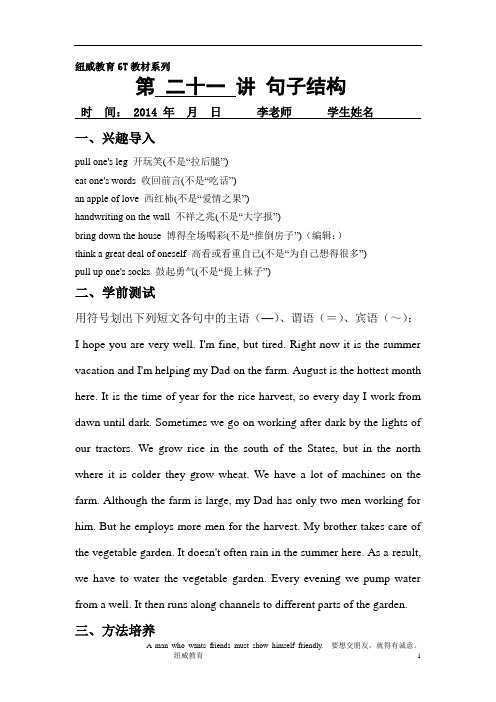
纽威教育6T教材系列第二十一讲句子结构时间: 2014 年月日李老师学生姓名一、兴趣导入pull one's leg 开玩笑(不是“拉后腿”)eat one's words 收回前言(不是“吃话”)an apple of love 西红柿(不是“爱情之果”)handwriting on the wall 不祥之兆(不是“大字报”)bring down the house 博得全场喝彩(不是“推倒房子”)(编辑:)think a great deal of oneself 高看或看重自己(不是“为自己想得很多”)pull up one's socks 鼓起勇气(不是“提上袜子”)二、学前测试用符号划出下列短文各句中的主语(—)、谓语(=)、宾语(~):I hope you are very well. I'm fine, but tired. Right now it is the summer vacation and I'm helping my Dad on the farm. August is the hottest month here. It is the time of year for the rice harvest, so every day I work from dawn until dark. Sometimes we go on working after dark by the lights of our tractors. We grow rice in the south of the States, but in the north where it is colder they grow wheat. We have a lot of machines on the farm. Although the farm is large, my Dad has only two men working for him. But he employs more men for the harvest. My brother takes care of the vegetable garden. It doesn't often rain in the summer here. As a result, we have to water the vegetable garden. Every evening we pump water from a well. It then runs along channels to different parts of the garden. 三、方法培养组成句子的各个部分叫句子成分。
初中英语语法基础-句子结构和类型专题讲解--(附同步练习题无答案)精选全文

可编辑修改精选全文完整版初中英语语法基础句子结构与类型专题讲解一.句子的种类(一)根据结构划分:①简单句:(5种基本句型)S+Vi(主+谓)S+V系动词+ P (主+系+表)S+Vt+O(主+谓+宾)S+Vt+IO+DO(主+谓+间宾+直宾)S+Vt+O+OC(主+谓+宾+宾补)②并列句and, but, or, soThis is me and these are my friends.They must stay in water, or they will die.It’s not cheap, but it is very good.It was late, so I went to bed.③复合句:包含一个主句和一个或几个从句的句子叫复合句,从句由引导词或连词引导。
名词性从句(宾语,主语,表语,同位语)从句形容词性从句(定语从句)副词性从句(状语从句)(二)根据功能划分:陈述句, 祈使句, 感叹句,疑问句(一般疑问句,特殊疑问句,选择疑问句,反意疑问句等)1)陈述句:说明一个事实或陈述一种看法。
例如:Light travels faster than sound.光比声传播速度快。
(说明事实)The film is rather boring.这部电影很乏味。
(说明看法)2)疑问句:提出问题。
有以下四种:a. 一般疑问句:Can you finish the work in time?b. 特殊疑问句:Where do you live?c. 选择疑问句:Do you want tea or coffee?d. 反意疑问句:He doesn't know her, does he?3)祈使句:提出请求,建议或发出命令。
Don't be nervous!Let’s go fishing tomorrow.4)感叹句:表示说话人惊奇、喜悦、愤怒等情绪。
What good news it is ! How beautiful the girl is !二.简单句的基本句型介绍:1. 基本句型一:S+Vi (主+不及物动词)主语:可以作主语的成分有名词,主格代词,动词不定式,动名词等等。
- 1、下载文档前请自行甄别文档内容的完整性,平台不提供额外的编辑、内容补充、找答案等附加服务。
- 2、"仅部分预览"的文档,不可在线预览部分如存在完整性等问题,可反馈申请退款(可完整预览的文档不适用该条件!)。
- 3、如文档侵犯您的权益,请联系客服反馈,我们会尽快为您处理(人工客服工作时间:9:00-18:30)。
纽威教育6T教材系列第二十一讲句子结构时间: 2014 年月日李老师学生姓名一、兴趣导入pull one's leg 开玩笑(不是“拉后腿”)eat one's words 收回前言(不是“吃话”)an apple of love 西红柿(不是“爱情之果”)handwriting on the wall 不祥之兆(不是“大字报”)bring down the house 博得全场喝彩(不是“推倒房子”)(编辑:)think a great deal of oneself 高看或看重自己(不是“为自己想得很多”) pull up one's socks 鼓起勇气(不是“提上袜子”)二、学前测试用符号划出下列短文各句中的主语(—)、谓语(=)、宾语(~):I hope you are very well. I'm fine, but tired. Right now it is the summer vacation and I'm helping my Dad on the farm. August is the hottest month here. It is the time of year for the rice harvest, so every day I work from dawn until dark. Sometimes we go on working after dark by the lights of our tractors. We grow rice in the south of the States, but in the north where it is colder they grow wheat. We have a lot of machines on the farm. Although the farm is large, my Dad has only two men working for him. But he employs more men for the harvest. My brother takes care of the vegetable garden. It doesn't often rain in the summer here. As a result, we have to water the vegetable garden. Every evening we pump water from a well. It then runsalong channels to different parts of the garden.三、方法培养组成句子的各个部分叫句子成分。
英语句子成分有主语、谓语、宾语、表语、定语、状语、宾语补足语、主语补足语和同位语,其中主语、谓语、和宾语是句子的主要成分,其余的均为次要成分。
1.主语主语是句子要说明的人或事物,是句子的主体,一般由名词、代词、数词、不定式或动名词等充当。
○1名词或名词短语作主语Weather in our coastal city is nice and cool in summer. 夏季我们沿海城市的天气舒适、凉爽。
○2代词作主语He told a joke but it fell flat. 他说了个笑话,但没引人发笑。
○3数词作主语Three is enough for each of us.三个对于我们每个人来说就足够了。
○4动词不定式或不定式短语作主语To become a player like Yao Ming is my wish. 成为像姚明一样的运动员是我的心愿。
○5名词化形容词和名词化分词作主语To wounded should be sent to hospital at once. 受伤人员应立即送往医院。
○6动词的—ing 形式作主语Taking a walk after supper is good for our health.晚饭后散步对我们的健康有好处。
○7从句作主语作主语的从句称为主语从句,可由that, whether, wh—词等引导。
Whenever you are ready will be fine. 你无论什么时候准备好都行。
2.谓语说明主语的动作或状态,也是句子的主体部分,一般由动词充当。
动词分为实义动词、连系动词、情态动词和助动词。
实义动词单独作谓语,连系动词与表语一起构成谓语,情态动词与省略to的不定式构成合成谓语,助动词与动词原形共同构成谓语部分。
如:I felt cold.我感觉冷。
(系动词+表语)How can I get to the Great Wall? 我怎样能到达长城?(情态动词+实义动词)3.宾语宾语是及物动词所涉及的对象,一般由名词、代词、不定式及动名词等充当。
如:They are teachers. 他们是老师。
(名词)We enjoy playing football.我们喜欢踢足球。
(动名词)4.定语用于修饰名词或代词,一般由形容词、名词、数词、不定式等充当。
如:She is a chemistry teacher. 她是一个化学老师。
(名词)I have something important to tell you.我有重要的事情要告诉你。
(形容词)5.状语用于修饰动词、形容词、副词或全句,一般由副词、介词短语、不定式短语或从句充当。
单个副词作状语一般放在被修饰词之前,短语或从句放在句首或句末。
副词修饰动词时应放于动词之后。
如:The students study hard. 这些学生学习努力。
(副词)We were having dinner when the telephone rang.电话铃响时我们正在吃晚饭。
(从句)6.表语用于说明主语的身份、特征或感受,一般由名词、数词、形容词、分词等充当。
常用的连系动词有:be, look, get, sound(听起来),feel, become, smell, turn等。
如:○1名词作表语She is an ordinary teacher. 她是一个普通的老师。
○2代词作表语You are many, but they are few. 你们人多,但他们人少。
○3数词作表语He was the first to leave but the last to arrive. 他是第一个走的,却是最后一个到的。
○4形容词作表语The dish tastes delicious.这道菜常起来很好吃。
○5动词的-ing形式和-ed形式作表语I am quite surprised to see you here. 在这里见到你我感到非常惊讶。
○6介词短语作表语We were at table when you called.你来电话时我们正在吃饭。
○7动词不定式或短语作表语My job is to look after the baby. 我的工作就是照顾这个婴儿。
○8副词及其短语作表语He is out of home. 他不在家。
7.宾语补足语用于补充说明宾语的情况,一般位于宾语之后,宾语与宾语补足语一起构成复合宾语。
需接复合宾语的动词有:tell 告诉,let让,help帮助,teach 教,ask问,see看见,have让,order命令,make使,等。
“宾补”一般由不定式短语、分词、名词、形容词等充当。
如:The doctor told me to do more exercise.医生告诉我多做练习。
(不定式短语)I’ll have my car repaired.我要让人修车。
(过去分词)8.同位语一个名词(或其他形式)对另一个名词或代词进行修饰,限定或说明,这个名词(或其他形式)就是同位语。
同位语与被它限定的词的格要一致,并常常紧挨在一起。
○1由两个或两个以上同一层次的语言单位组成的结构,其中前项与后项所指相同,句型性能也相同,后项是前项的同位语。
Mr. Wang, our new teacher, is very kind to us.我们的新老师—王先生对我们很好。
○2如同位语与其同位成分关系紧密时不用逗点隔开;如同位语对其同位成分只作补充解释时可用逗点隔开。
He told me that his uncle John is a world-famous doctor. 他对我讲,他的叔叔约翰是一位世界闻名的医生。
He has read all kinds of books, ancient and modern, Chinese and foreign.他看了各种各样的书,古今中外都有。
○3同位语除表示其同位成分的全部意义外,还可以表示部分意义。
We Chinese people are brave and hard-working. 我们中国人民是勤劳勇敢的。
Amy is interested in sports, especially ball games.艾米喜欢运动,特别是球类运动。
四、强化练习(一). 指出下列句中主语的中心词 (4分,4分钟)① The teacher with two of his students is walking into the classroom.② There is an old man coming here.③ The useful dictionary was given by my mother last year.④ To do today's homework without the teacher's help is very difficult.(二). 选出句中谓语的中心词 (10分,10分钟)① I don't like the picture on the wall.A. don'tB.like C. picture D. wall② The days get longer and longer when summer comes.A. getB.longer C. days D. summer③ Do you usually go to school by bus?A. DoB.usually C. go D. bus ④ There will be a meeting at the library this afternoon.A. will beB. meetingC. the libraryD. afternoon⑤ Did the twins have porridge for their breakfast?A. DidB. twinsC. haveD. breakfast⑥ Tom didn't do his homework yesterday.A. TomB.didn't C. do D. his homework⑦ What I want to tell you is this.A. wantB. totell C. you D. is⑧ We had better send for a doctor.A. WeB.had C. send D. doctor⑨ He is interes ted in music.A. isB.interested C. in D. music⑩ Whom did you give my book to?A. giveB.did C. whom D. book 五、训练辅导改错1.I live in the country and my father was a farmer. 1.__________He is now forty-five year old. Because of years of 2.__________hard work, he looks old than his age. When I was 3. __________ young, he used to tell me the importance study. 4. __________ Father knows little about English but other subjects, 5. __________ but he usually gives me some good advices on how 6. __________ to learn my lessons good. He is not only kind to me 7. __________but also very strict in me. With his help, I’ve made 8. __________great progress. I’ll never to forget what he taught 9. __________me. I think my father is best father in the world. 10. _________完形填空1Different things usually stand for different feelings. Red, for example, is the color of fire, heat, blood and life. People say red is an exciting and active color. They associate(使发生联系) red with a strong feeling like 1 . Red is used for signs of 2 , such as STOP signs and fire engines. Orange is the bright, warm color of 3 in autumn. People say orange is a 4 color. They associate orange with happiness. Yellow is the color of __5__. People say it is a cheerful color. They associate yellow too, with happiness. Green is the cool color of grass in __6__. People say it is a refreshing color. In general, people __7__ two groups of colors: warm colors and cool colors. The warm colors are red, orange and __8__. Where there are warm color and a lot of light, people usually want to be __9__. Those who like to be with __10 _ like red. The cool colors are __11_ and blue. Where are these colors, people are usually worried. Some scientists say that time seems to __12 _ more slowly in a room with warm colors. They suggest that a warm color is a good __13_ for a living room or a __14_ . People who are having a rest or are eating do not want time to pass quickly. __15 colors are better for some offices if the people working there want time to pass quickly.1. A. sadness B. anger C. administration D. smile2. A. roads B. ways C. danger D. places3. A. land B. leaves C. grass D. mountains4. A. lively B. dark C. noisy D. frightening5. A. moonlight B. light C. sunlight D. stars6. A. summer B. spring C. autumn D. winter7. A. speak B. say C. talk about D. tell8. A. green B. yellow C. white D. gray9. A. calm B. sleepy C. active D. helpful10. A. the other B. another C. other one D. others11. A. black B. green C. golden D. yellow12. A. go round B. go by C. go off D. go along13. A. one B. way C. fact D. matter14. A. factory B. classroom C. restaurant D. hospital15. A. Different B. Cool C. Warm D. All六、反思总结堂堂清A farmer saw an old man growing something on the other side of the river.The farmer 1. ________ out to him, “What are you growing , Grandpa? ”The old man 2 . ________ for a moment, then said, “Swim over 3. ________ I’ll tell you.”The farmer didn’t like the 4. ________ of swimming across the river. But he wanted to know 5. ________ the old man was doing. He swam over. The old man said very 6. ________ in his ear, “ I’m planting peas in my 7. ________ .”“ You should have shouted. I would have 8. ________ quite clearly on that side.” Said the farmer.“ Oh, no, I wouldn’t 9. ________ that . The sparrows would have heard me and 10. ________ my peas.”(注:可编辑下载,若有不当之处,请指正,谢谢!)。
